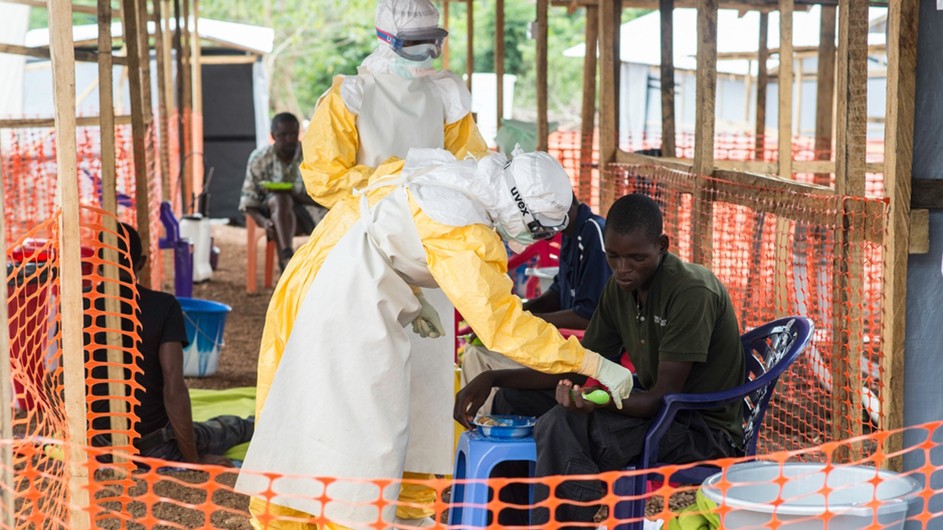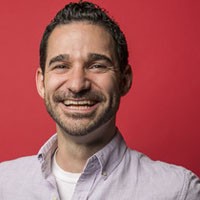The Global Response to Ebola Outbreak: What Took So Long?
Columbia physician and Ebola survivor Craig Spencer says community engagement and trust-building are the best tools to combat the epidemic.

On July 17, the World Health Organization (WHO) declared the Ebola outbreak in the Democratic Republic of Congo a global public health emergency. The virus, which took hold in the region last year, has infected more than 2,600 people and killed 1,700.
Craig Spencer, the director of global health in emergency medicine at New York-Presbyterian/Columbia Medical Center, questions whether the WHO took too long to declare the current outbreak a global health emergency.
“As case numbers continue to climb,” said Dr. Spencer, who made headlines in 2014 when he contracted Ebola after returning from Guinea where he was working with Doctors Without Borders, “it’s reasonable to argue that this emergency should have been declared earlier.”
We talked with Dr. Spencer about the challenges of bringing this epidemic under control, lessons learned and progress made in fighting and containing the virus.
Alliance Interview with Dr. Craig Spencer
Q. Why did it take WHO so long to declare the current outbreak a global health emergency?
A. The outbreak in eastern DR Congo has been difficult for many reasons, all of which have challenged the Ebola response and ultimately WHO’s decision whether to declare this a global public health emergency. The outbreak is in an area with decades of conflict and instability. This has led to poor health infrastructure, mobility and distrust. Also, much like the Ebola outbreak in West Africa, this one is along a border that includes other countries, and the risk of regional spread has always been high. The WHO had to consider all these factors when declaring an emergency, something it doesn’t do lightly. It sounds non-controversial, but once a public health emergency is declared, decisions are made at a different level, and there can be negative consequences for the host government in terms of stigma, travel restrictions and border closures.
Q. What is the objective of this decision and how does this change things?
A. The goal of an emergency declaration is to mobilize global resources. But there hasn’t been a dramatic change in the past few weeks that prompted WHO to finally declare the emergency. There were cases in Uganda, but they were quickly contained. There will likely be more regional cases, but the risk of international exposure is still low. In the days after the declaration, more resources have been mobilized, including additional staff from the African Centers for Disease Control and Prevention and $300 million from the World Bank. But the question is why this wasn’t done before, given that the situation on the ground was almost exactly the same. More than a massive infusion of cash, what’s needed in this outbreak is more community engagement and trust-building. It’s safe to say that although the declaration may help, it will be no magic bullet.
Q. Can you explain why Ebola is so deadly and hard to contain?
A. The current outbreak is caused by Ebola Zaire, one of the five different types of Ebola virus and the strand with a mortality rate up to 90 Percent. Contrary to popular depiction, most people infected with Ebola do not have significant bleeding symptoms but die of complications linked to fluid loss or organ failure. What makes Ebola so deadly is that outbreaks usually occur in places where the health care infrastructure is weak and people are cared for by loved ones in the home, many of whom are subsequently infected with the virus. Even at many health care facilities, the tools needed to prevent infection—gloves, running water—are in short supply, making health care workers vulnerable.
The reason Ebola is so hard to contain is that we don’t always take into consideration the socio-cultural understanding of disease. The result is that many communities don’t trust outsiders, whether from a different part of the world or a different part of the country. This leads to rumors that the disease is not real, imported by outsiders, or it is a plot to destroy their communities. Imagine how you’d feel if a bunch of people from another part of the world came to your house in spacesuits, sprayed stuff on the walls, burned belongings of your deceased loved ones and then others in your community started getting sick a few days later. Although we have the tools to fight Ebola, we frequently overlook the most critical tool: engaging the community and gaining its trust.
Q. Are researchers making progress developing better tools to battle Ebola? What lessons have disaster relief organizations learned?
A. What is remarkable about this outbreak is that despite a vaccine and some novel therapeutics, the case numbers continue to climb. In the wake of the West African outbreak, many thought we would never see large outbreaks again, and although the cases numbers in DR Congo are still only a tenth of what we saw in West Africa, the fact that the outbreak is still gaining steam after almost a year is a testament to our failure.
So yes, we’ve made some progress developing tools to battle Ebola. The vaccine that’s been given to over 150,000 people in DR Congo has an effectiveness as high as 97.5 percent, and data for some of the new clinical treatments are encouraging. But frankly, these mean nothing if we can’t get access to people who are sick or who’ve been exposed to Ebola. What’s most frustrating is that engaging with communities early on and consistently was supposedly one of the big “lessons learned” from the West African outbreak, where we faced very similar challenges. It seems like we still have a lot to learn.
Q. You wrote an essay in the New England Journal of Medicine in 2015 talking about how officials and the media maligned you and others who were risking their lives to combat the West African epidemic. What danger does this kind of thinking pose in an infectious disease crisis?
At that time, I was very concerned that we were putting politics over public health. We were completely focused on the theoretical risk of an outbreak in this country instead of the fact that thousands in West Africa were being decimated by the virus. Gripped by fear, many listened to grandstanding governors or political candidates who promised quick fixes to curtail any risk, even if what they were proposing was counterproductive from a public health standpoint.
As a medical and public health community, we need to be more actively involved in communicating facts during outbreaks. I’m worried about how the U.S. would respond if faced with a similar situation today. Much of the infrastructure and preparedness funding that was put in place for the West Africa outbreak has been dismantled. Few of our health care providers have any on-the-ground experience taking care of patients with viral hemorrhagic diseases, and I can tell you that no level of drilling or simulation can prepare you for taking care of an Ebola patient. And if the president responds like he proposed on Twitter back in 2014—closing down borders, not allowing infected American health care workers back into the U.S. for treatment and restricting travel—there would be drastic public health consequences.

Craig Spencer, MD MPH, is the director of global health emergency medicine at New York-Presbyterian/Columbia University Medical Center. He currently divides his time between providing clinical care in New York and working internationally in public health. He has worked in Africa and Southeast Asia as a field epidemiologist on numerous projects examining access to medical care and human rights, including coordinating Doctors Without Borders national epidemiological response in Guinea during the Ebola outbreak.